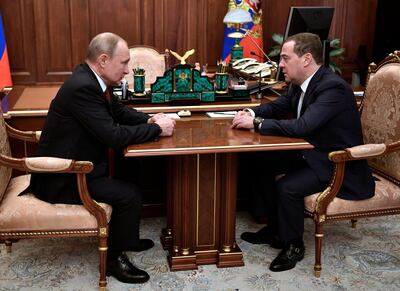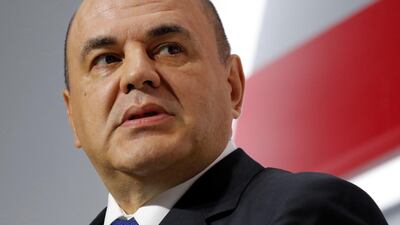Russian President Vladimir Putin has named tax service chief Mikhail Mishustin as the country's new prime minister, only hours after the resignation of close ally Dmitry Medvedev.
Earlier in the day, Mr Medvedev told Mr Putin that his government was resigning to make way for constitutional changes, the Tass and Ifax news agencies reported on Wednesday.
The former prime minister made the announcement on state TV as he sat next to Mr Putin, who thanked Mr Medvedev for his work.
The announcement for Mr Medvedev's resignation and his replacement came hours after Mr Putin called for a series of constitutional changes in his annual address.
Mr Medvedev, who led the government since 2012 when he stepped down as president to make way for Mr Putin’s return to the Kremlin, has agreed to become deputy head of the security council, according to Tass. Mr Putin said the government hasn’t managed to fulfil all its tasks, Interfax reported.
Mr Putin has asked the departing administration to fulfil its duties until the new government is formed, Ifax said. Mr Putin, the agency said, will decide the make-up of the new government.
In his address on Wednesday, Mr Putin proposed tweaking the Russian constitution to increase the powers of parliament and the Cabinet, a move that could herald his intention to take a political position that would let him stay at the helm after his presidency ends.
He suggested amending the constitution to allow politicians to name prime ministers and Cabinet members. The authority to make those appointments currently belongs to Russia’s president.
“It will increase the role of parliament and parliamentary parties, powers and independence of the prime minister and all Cabinet members,” Mr Putin told an audience of top officials and politicians.
At the same time, Mr Putin argued that Russia would not remain stable if it were governed under a parliamentary system. The president should retain the right to dismiss the prime minister and Cabinet ministers, to name top defence and security officials, and to be in charge of the Russian military and law enforcement agencies, he said.
Mr Putin emphasised that constitutional changes must be put to a nationwide vote.
Putin’s term expires in 2024, and Russia’s political elite have been abuzz with speculation about his future plans.
Mr Putin, 67, has remained at the helm for more than 20 years – longer than any other Russian or Soviet leader since Josef Stalin. He will have to step down after his term ends under the current law, which limits the president to two consecutive terms.
Political analyst Kirill Rogov said Mr Putin’s proposals indicate his intention to remain in charge while re-distributing powers between various branches of government.
“Such a model resembling the Chinese one would allow Putin to stay at the helm indefinitely while encouraging rivalry between potential successors,” Mr Rogov said on Facebook.
Alexei Navalny, the most prominent Russian opposition leader, tweeted that the president’s speech signalled Mr Putin’s desire to continue calling the shots after his term ends.

Mr Putin served two presidential terms in 2000-2008 before shifting into the prime minister’s seat for four years to observe the term limit. His placeholder as president, Mr Medvedev, stepped down after one term to allow his mentor to reclaim the senior job in 2012. While in office, Mr Medvedev raised the presidential term from four to six years.
Mr Putin also emphasised the need to amend the constitution to give it a clear priority over international law.
“The requirements of international law and treaties and decisions of international organs can only be valid on the territory of Russia as long as they don’t restrict human rights and freedoms and don’t contradict the constitution,” he said.
He also said that the constitution must be tweaked to say that top government officials aren’t allowed to have foreign citizenship or residence permits.
Mr Putin focused his state of the nation address on the need to encourage population growth and create new incentives for economic growth.
He said that the authorities need to do more to encourage new births and support young families. He promised that the government would offer additional subsidies to families that have children.
Mr Putin emphasised that low incomes remain a key obstacle to population increase. Russia’s population currently stands at about 147 million.
Mr Putin promised to encourage high-tech industries and to ease excessive business regulations.
The Russian leader said that Russia would remain open for cooperation with all countries while maintaining a strong defence capability to fend off potential threats.
He added that new weapons systems would protect Russia’s security “for decades ahead.”
“For the first time in history, we aren’t trying to catch up with anyone,” Mr Putin said. “On the contrary, other leading nations are yet to develop the weapons that Russia already has.”

